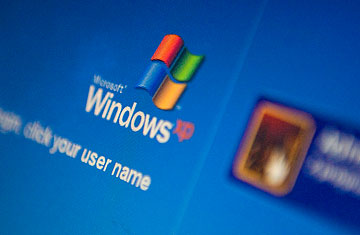
First, a disclaimer: I don't like Windows XP. Microsoft's current operating system, Windows 7, is slicker, safer, less annoying and just plain better. I recommend it frequently and wince when I find myself having to use an XP machine.
That said, I'm fascinated — and, in a peculiar way, inspired — by XP's astonishing longevity. Microsoft formally introduced the software at a rather somber press event on Oct. 25, 2001, in New York City, just six weeks after the 9/11 attacks. A decade later, it's still the planet's most widely used operating system. Absolutely nobody would have predicted that back in 2001, when an operating system that was more than three years old was considered to be long in the tooth.
For Microsoft, XP's 10th birthday isn't exactly a cause for celebration — the fact that millions of consumers and businesses have spurned both Windows Vista and Windows 7 wounds the company's ego and hurts it in the pocketbook. So "Commemorating Windows," a blog post by vice president of Windows Commercial Marketing Rich Reynolds, waxes nostalgic only briefly before moving on to the business at hand: urging XP users to dump it and move to Windows 7. That's not startling. When Windows 8 ships next year, Microsoft will recommend that upgrade too.
The folks in Redmond, Wash., aren't the only ones who are uncomfortable with Windows XP's continued existence. For tech enthusiasts, the notion of millions of people willfully using a decade-old piece of software is baffling. Sites that covered the anniversary tended to go with stories with titles like "Happy 10th Anniversary, Now Die Already" and "It's Time Windows XP Went the Way of the Dodo." Everybody, it seems, agrees that XP's time is over.
Everybody, that is, except for vast quantities of real people who aren't ready to give it up. What gives?
There's no one reason why Windows XP has become the Methuselah of desktop operating systems. Some people are technological Luddites on principle, or cling to computers so ancient that they can't run a modern operating system. Certain businesses run aging but mission-critical applications that won't work with current versions of Windows. And even companies that are open-minded about upgrades often approach them very, very slowly. But all of these issues have been around for as long as there have been operating systems, and therefore don't explain XP's durability.
With Windows XP, the most obvious unique factor is Microsoft's botched launch of Windows Vista, XP's would-be replacement. Microsoft released it in January 2007 only after repeated delays, but the software still had an unfinished feel. People who installed Vista on PCs that had come with Windows XP often found that it was unbearably sluggish and flaky. Actually, even people who bought brand-new computers with the new operating system preinstalled often had trouble with it. Many of them went back to XP; many more who never bought Vista in the first place decided not to go there.
Eventually, Microsoft patched up Vista enough that it worked better, but the software's reputation was already fatally damaged. And even if Vista had worked better from the get-go, it might have had a tough time dislodging XP from the world's PCs. As its tagline — "The wow starts now" — suggests, it focused on glitz, like the transparent windows of its fancy new Aero user interface. Meanwhile, many basic problems with XP went unfixed.
By rejecting Vista, consumers and businesses told Microsoft they didn't want their operating system to wow them. They just wanted it to recede into the background, allowing them to get work done with a minimum of surprises. Windows 7 does that better than XP or Vista ever did. But by the time it debuted in 2009, people had discovered that it was possible to just keep on using Windows XP.
That represented a dramatic change in public opinion: back in 1995, PC owners had queued up at CompUSA at midnight to buy Windows 95, like modern-day Apple fans clamoring for a new iPhone. In the post-Vista era, plenty of perfectly intelligent Windows users concluded that good enough was good enough.
Once people decide that, it can be hard to change their minds. And because XP remains so pervasive, the industry has adjusted to accommodate all those users who refuse to give it up. Most new software and hardware add-ons still support it, reducing the chances that anyone will feel that they're being forced to upgrade to Windows 7. (Notable exception: Microsoft's own Internet Explorer 9, the only major Web browser that won't run on XP.)
When I spoke to Microsoft's Reynolds this week, he repeated the talking points that the company is stressing: "Windows XP was fantastic for its time, but clearly, times have changed." He's right, of course. He also told me that many of the companies who are still standardized for now on Windows XP really do have plans to move to Windows 7. That pleases me. Like I said, I think Windows 7 is an extremely worthy upgrade.
I can't be too mad at the XP holdouts, though. There was a time when people thought Microsoft was an 800-lb. bully who could shove stuff down its customers' throats with impunity. Now we know that's not true. Microsoft customers, en masse, are far more powerful than Microsoft ever was. They're the deciders — and for now, they've decided that they're not done with XP just yet. That's a choice I respect, even as I do everything in my power to avoid using it myself.
McCracken blogs about personal technology at Technologizer, which he founded in 2008 after nearly two decades as a tech journalist; on Twitter, he's @harrymccracken. His column, also called Technologizer, appears every Thursday on TIME.com.
